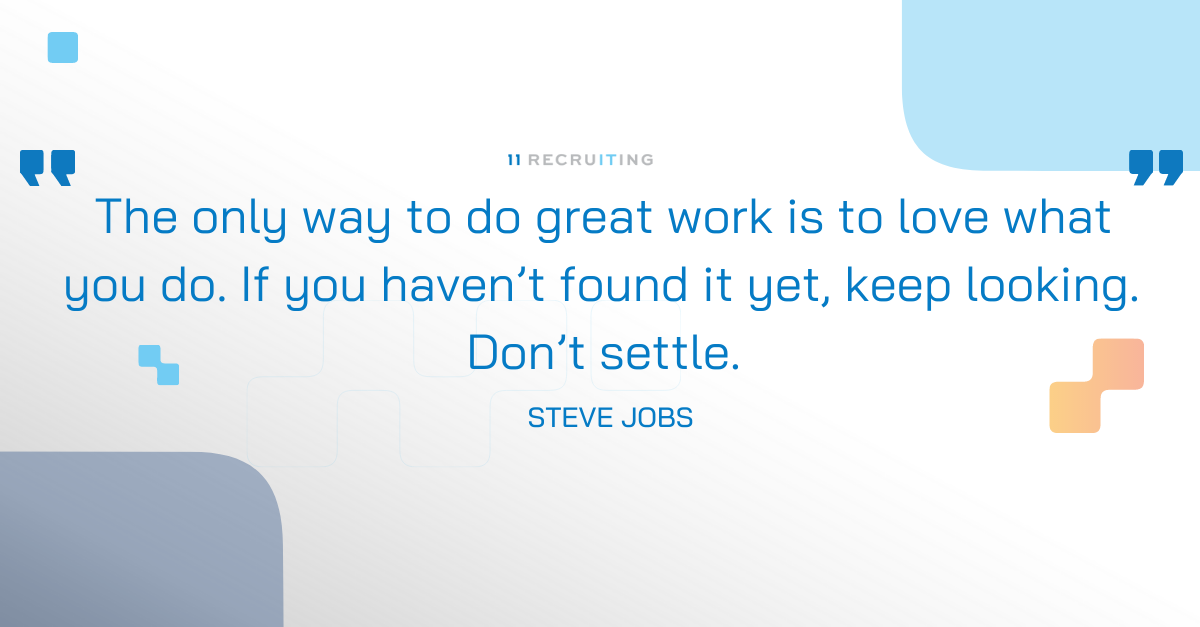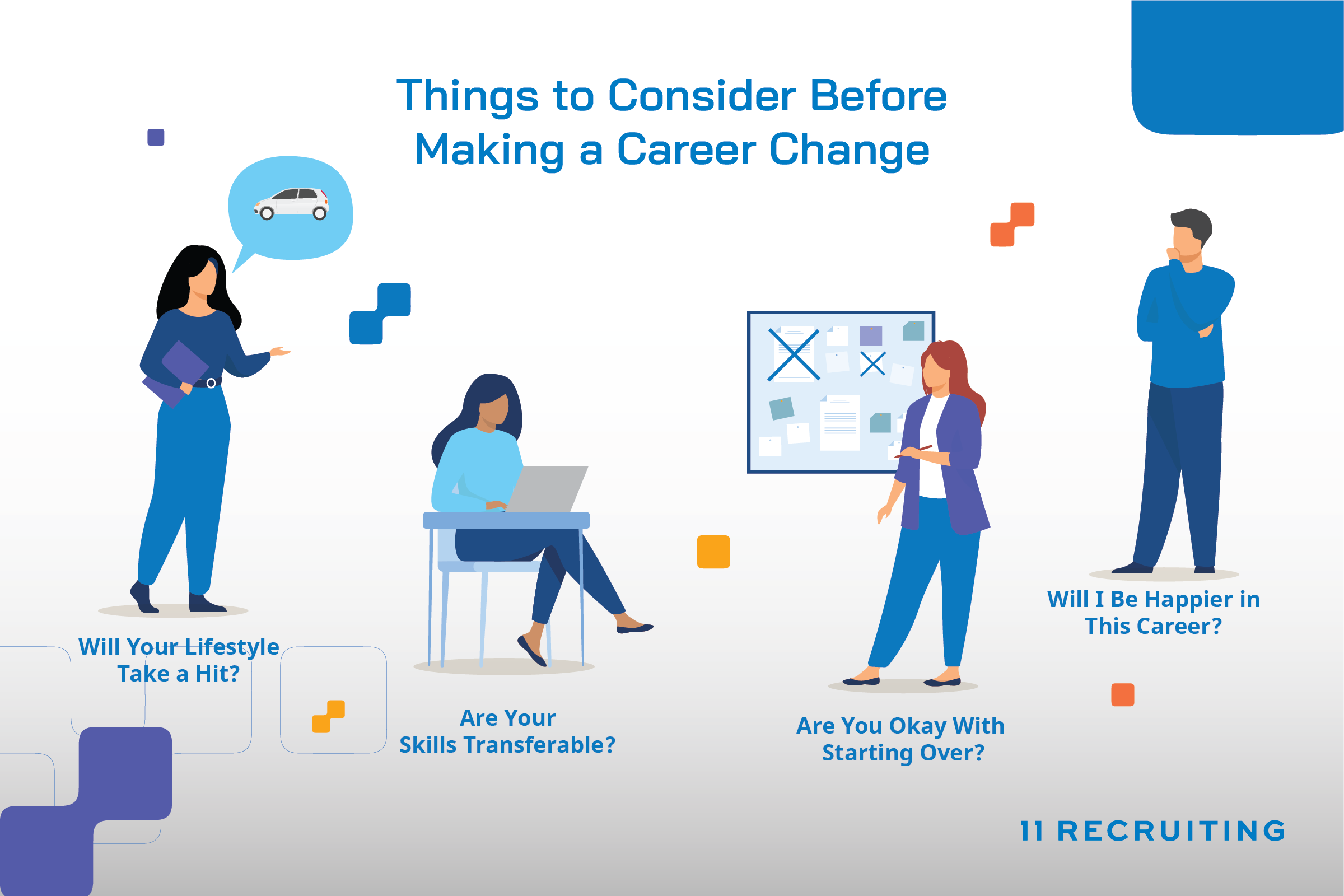

‘The only way to do great work is to love what you do. If you haven’t found it yet, keep looking. Don’t settle.’ – Steve Jobs
The prospect of a career change (or deciding if you should change careers) can be scary. Like marriage, it’s one of those life decisions that require careful thought and deliberation. It’s one of those choices that’s the most difficult you’ll ever make.
But don’t worry, this article will help you make this choice. We’ll discuss the signs that signal it’s time for a career change, the things you should consider before making any decisions, the pros and cons of a career change, and how to navigate starting a new career in your midlife.
Is it Time For a Career Change? (Top 6 Signs You Need To Look Out For)
1. Do You Feel Bored and Uninspired?
Boredom and feeling uninspired are sure-fire signs that it might be time for a career change. Boredom manifests itself in different ways, from producing single-sentence emails to dropping the ball on deadlines.
Don’t blame yourself if you feel uninspired or bored. Boredom eventually drives people to search for new things; Your mind wants to do something different. And when you finally take the step to do that, you’ll feel invigorated.
2. Do you Dread Going to Work?
If getting up in the morning makes you dread the day before it’s even begun, then you might not want to keep your current job for long. Dread can suck the joy out of your life and cause stress and anxiety. Each day you feel these emotions in your system, your energy gets sapped – making you lethargic, mess up at work, and feel miserable.
3. Is it All About Money?
Is it all about the money and not about passion? If you work solely to make money, but you find no heart in what you do, then you’re destined not to find flow, meaning, and happiness in your life (with your current job, that is). You might want to consider a career change that aligns with your passion.
4. Is your emotional life taking a hit?
Sometimes a lousy work situation can affect your emotional life. You may be going to work every day with a negative attitude and projecting it to the people around you — like your family and friends. If this is happening, you need a change of scenery to make sure that you’re not doing damage to your self-esteem or relationships.
5. Do You Have An Increasing Amount of Bad Habits Piling Up?
Are you finding yourself drinking more, staying up late at night, numbing yourself with food, TV, or social media? It’s understandable – dissatisfaction and unfulfillment in the workplace can lead to a pile-up of bad habits. Engaging in these habits daily will decrease the quality of your life and send you on a downward spiral.
6. Does Your Career Make Use Of Your Skills?
Maybe you have a creative mind, and you would be better off in a field that utilizes your artistic side. However, if you’re stuck in a job that makes you work on robotic tasks, It would kill that creative drive. Time for a career change.
Not only will you feel dead inside, but it can lower your self-confidence since you’re not using your full potential.
Things to Consider before Making a Career Change

Are You Okay With Starting Over?
Changing careers might require you to start at the bottom and work your way to the top. This might sound daunting especially for people with no backup plan.
Ask yourself if you’re willing to go through that. It may require you to work longer hours to establish yourself, earn less than what your current job is offering, and lose any accolades you’ve gained so far.
Are Your Skills Transferable?
A career with transferable skills will make your career change move easier. For example, sales, marketing, and management are skills that can be utilized in other jobs. With transferable skills, you don’t have to start at rock bottom.
Will your Lifestyle take a hit?
Maybe your current job affords you a lot of luxuries in life. This might change if you change your career (because you’ll start at the bottom, which often means you’ll get entry-level pay).
Will I be Happier in this Career?
It’s essential to figure out whether a new career will give you joy. One way to do this is to ‘test-drive’ it. Part-time jobs or internships are a fantastic way to try out a new career option; you can always quit if you find the work boring or unsatisfactory.
Pros and Cons of Career Change
Pros
- Growth – Chances are, if you want to make a career change, you’ve probably stopped growing in your current career. A new job will push you, bring out new skills, and give you new experiences that you’ll actually like.
- Reduced stress and more joy – Finding the right career that’s a good fit for your talents and skills will bring more flow into your life, which in turn will also reduce the stress.
- A sense of control – Just by taking charge and making a bold move of changing careers, you will gain a sense of control in your life.
- Increase in income – While you may find yourself earning less, especially when your career change involves starting at ground zero, you’ll have more potential to earn more in the long-run since you actually are personally invested in your career. Not just money driven. Funny how that works.
Cons
- Start from Scratch – Like I mentioned, a career change can involve starting from scratch. This can be a bummer, but that’s a necessary evil and a step you must make.
- Financial Uncertainty – During the period between quitting your old job and finding a new one, you’ll find yourself filled with uncertainty. It can take months to find a new job, and since you’ve lost your steady pay, you’ll definitely take a financial hit.
- Competition – When you change careers, you’ll find yourself competing with people who have years of experience in the field. This can be a disadvantage when you’re new, but if you’re passionate about the job, you can be just as good, or even outperform the others in a few months or years.
- Stress and exhaustion – When starting a new career, it’s essential to put your best foot forward. This often involves hustling harder and working longer hours. All of this can lead to stress, exhaustion, and burnout if you’re not careful. So it’s important to pace yourselves in such cases.
Tips For Those Looking For a Career Change in Your 30s, 40s, and 50s
I’ve lost count of the number of people who have asked me how they can find a new, more rewarding career in their midlife. They’re stuck in jobs that don’t challenge them or pay well. Perhaps they were forced into early retirement by circumstances beyond their control—a layoff, illness, or even a foreclosure on their house after their spouse was laid off. Or maybe they simply want to make a change after years of doing the same job, day in and day out.
For many people, this stage of life is rife with anxiety and fear— if you’ve lost your job, there’s also the additional pressure of making ends meet with no safety net.
Don’t despair. Here are a few things you can do to jumpstart your search for a new career:
- Assess your skills and interests – What do you like to do? Looking back at your life, what were you good at? Chances are, there’s a job out there that matches those qualities. Start by making a list of your skills and abilities. What do you like to do for fun? What are you passionate about? Jot down everything, no matter how small it seems.
- Do your research – Once you have a list of potential careers, do some digging to learn more about them. What is the job outlook in that field? What kind of education and training does it require? How much money can you expect to make? What’s the job environment like?
- Network – Asking for advice from people in your network is a great way to find out about potential jobs and get connected with contacts who might be able to help you. Attend professional association meetings or conferences that are related to your field of interest. You might meet people who can introduce you or even give you an informal interview.
- Try something new – If there’s a specific job you’re looking for, volunteer your time in the area of work that interests you—even if it’s only once a week or part-time during evenings or weekends. You can also check to see if there are any free courses or seminars offered in your area.
- Get your resume ready to go—even before you’ve lined up a job interview. It will give you an idea of jobs you’re qualified for and how much work experience you have/ This can help you when you’re targeting specific positions.
- Stay positive – It can be tough to make a career change, but it’s important to keep your spirits up and stay motivated. Don’t give up on your dreams. Remember, the perfect job is out there waiting for you.
There are plenty of things to consider when making a mid-life career change. But if you take things one step at a time, you’ll be on your way to finding a new job that’s perfect for you. Our expert recruiters from Eleven Recruiting can help you go through the process step by step. Consider all the factors that prompted your need for a change.
Frequently Asked Questions
Can I Start a Career At 40?
Yes, you can start a career at 40, and plenty of people successfully start their careers at that age. You will need to take stock of your current skills and interests, research future jobs thoroughly, upskill yourself by taking courses, and keep applying to positions you want.
Our professional recruiters will guide you in discerning options through your career change in tech – see how our candidate services can support you in making the best decision for you and finding the right job fit.
Is it ok to switch careers?
Yes. Sometimes, switching careers is a strategy to raise your rank faster. You may have all the necessary leadership skills to become a manager but your current work doesn’t have the capacity to promote you, changing careers might give you the room for your desired position.
A switch in career can also give you a personal sense of fulfilment. If your current work is burning you out and you’ve exhausted all means to look for the silver lining, you might find yourself spiritually free when you do decide to switch careers.
What is Mid-Career Crisis?
Mid-career crisis is a feeling of doubt that often sneaks in the middle of your career journey. It’s similar to a mid-life crisis but focuses on your career. This often happens to professionals that are very driven and have a good deal of ambition. The feeling often starts when you reach a career plateau and could easily be confused with burnout.
One way to respond to a mid-career crisis is to talk to a professional in career development. Eleven Recruiting has professionals that could help you decide on which steps to take when you reach a mid-career crisis.

